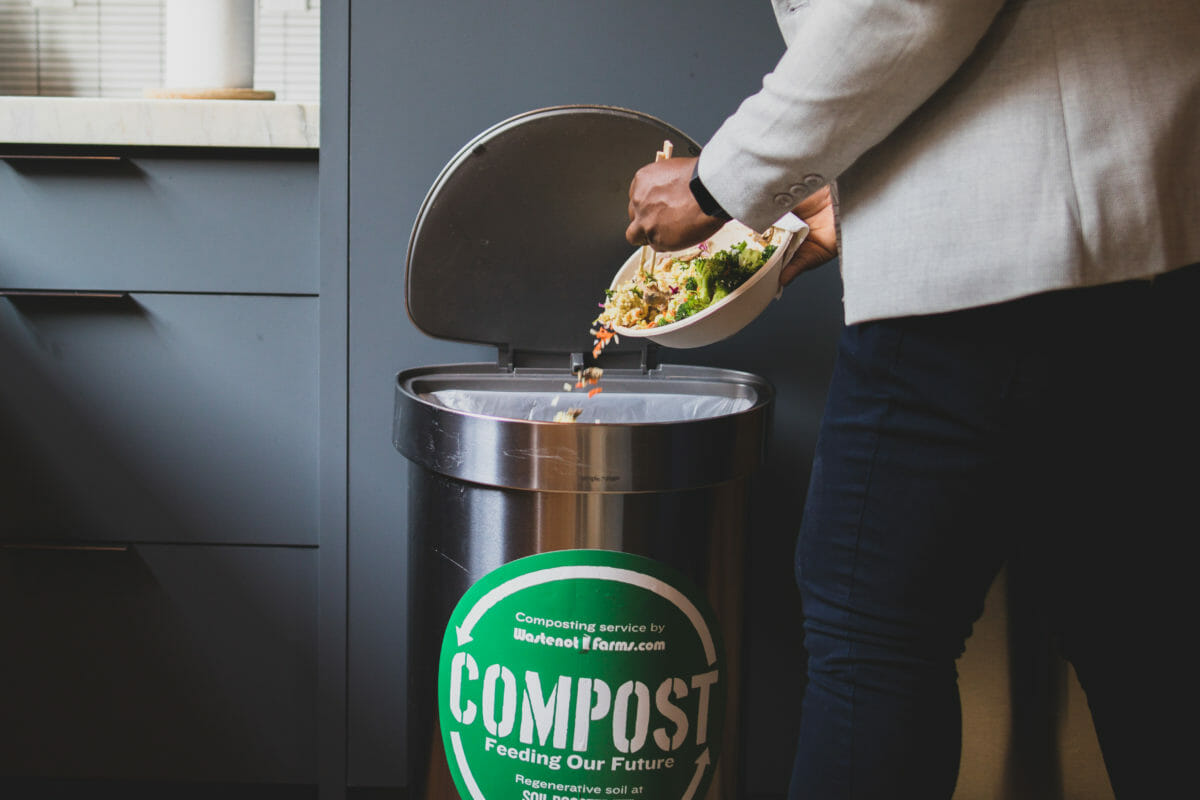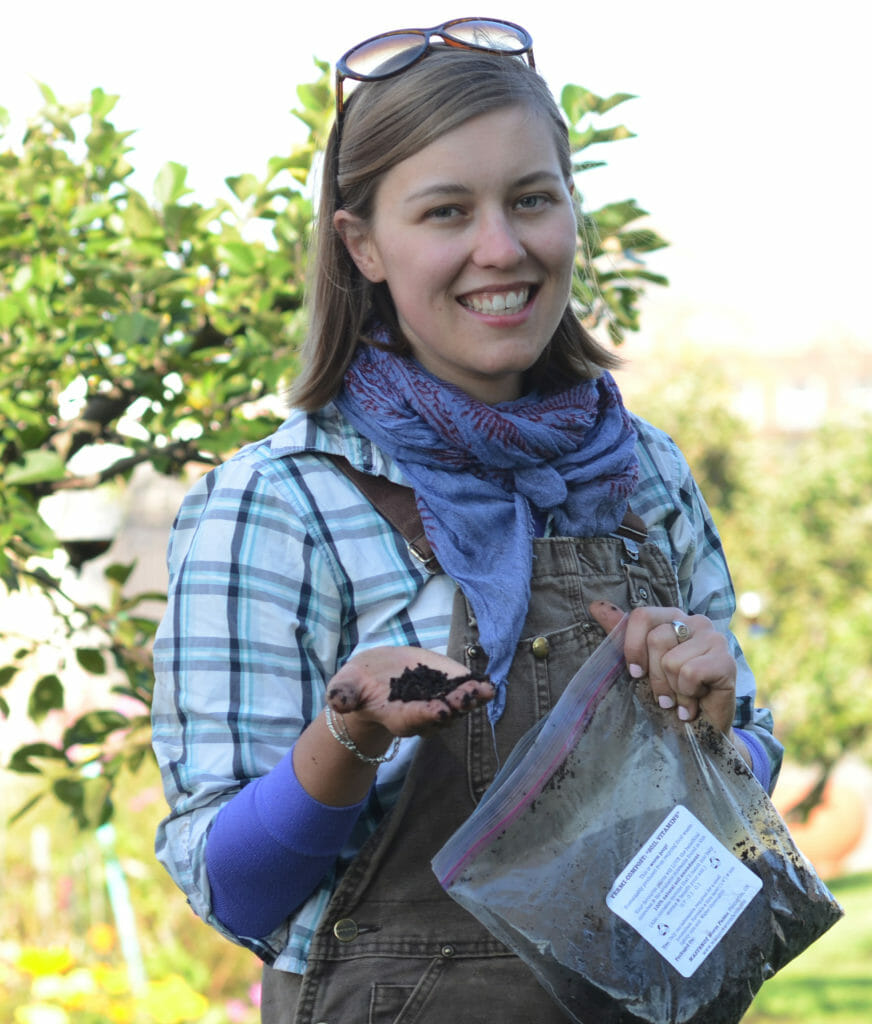This Canadian Worm Farm Turns Office Waste Into Plant Food
Waste not, want not—these worms do the work for you.
This Canadian Worm Farm Turns Office Waste Into Plant Food
Waste not, want not—these worms do the work for you.

Wastenot Farms collects food waste from businesses in Toronto and feeds it to worms. courtesy of Wastenot Farms
Unlike some worm farms, Jocelyn Molyneux’s operation doesn’t sell its worms for bait.
At Wastenot Farms, more than a million earthworms have been put to work munching through compostable waste to produce all-natural plant food for urban farmers.
“Our worms are our workers. So we keep them for ourselves and grow our capacity,” says Molyneux, who founded the farm six years ago.
The farm, which is around 45 miles north of Toronto, collects food waste from offices across the city for a small weekly fee. That waste is then fed to the worms in stacked bins for a couple of months until it is fully digested into castings (or soil). Wastenot Farms dries and sells those worm castings to urban farms and garden centers.
Molyneux first came up with the idea for the farm when she started working for a large waste management company after graduating from university. The self-professed “garbage geek” quickly learned that the company was sending compostable materials and recycling to a landfill. Nothing was being disposed of sustainably.
“This large waste management company was only interested in the bottom line and the cheapest option is always to send everything to a landfill in Michigan,” she says.
She knew that there were businesses in downtown Toronto that would want to be confident they were doing the right thing with their waste. She says one of the biggest barriers was finding offices that would also be willing to pay to have their organic waste taken away.
The business grew gradually through trial and error over the years and around 6,000 workers across Toronto now use Wastenot Farms’ compost bins in a week.

Molyneux’s worms eat everything from coffee grounds and orange peels to lunch leftovers and wooden chopsticks, which she says makes the microbes in her product particularly diverse. Other worm castings on the market can have fairly limited microbial content as they come from worms that are fed a single substance like soymeal.
“Worms are Mother Nature’s intestines,” Molyneux says.
Wastenot Farms is currently housed in an 800-square-foot barn on a friend’s horse farm, but Molyneux has plans to expand to a larger commercial facility.
Follow us
This work is licensed under a Creative Commons Attribution-NoDerivatives 4.0 International License.
Want to republish a Modern Farmer story?
We are happy for Modern Farmer stories to be shared, and encourage you to republish our articles for your audience. When doing so, we ask that you follow these guidelines:
Please credit us and our writers
For the author byline, please use “Author Name, Modern Farmer.” At the top of our stories, if on the web, please include this text and link: “This story was originally published by Modern Farmer.”
Please make sure to include a link back to either our home page or the article URL.
At the bottom of the story, please include the following text:
“Modern Farmer is a nonprofit initiative dedicated to raising awareness and catalyzing action at the intersection of food, agriculture, and society. Read more at <link>Modern Farmer</link>.”
Use our widget
We’d like to be able to track our stories, so we ask that if you republish our content, you do so using our widget (located on the left hand side of the article). The HTML code has a built-in tracker that tells us the data and domain where the story was published, as well as view counts.
Check the image requirements
It’s your responsibility to confirm you're licensed to republish images in our articles. Some images, such as those from commercial providers, don't allow their images to be republished without permission or payment. Copyright terms are generally listed in the image caption and attribution. You are welcome to omit our images or substitute with your own. Charts and interactive graphics follow the same rules.
Don’t change too much. Or, ask us first.
Articles must be republished in their entirety. It’s okay to change references to time (“today” to “yesterday”) or location (“Iowa City, IA” to “here”). But please keep everything else the same.
If you feel strongly that a more material edit needs to be made, get in touch with us at [email protected]. We’re happy to discuss it with the original author, but we must have prior approval for changes before publication.
Special cases
Extracts. You may run the first few lines or paragraphs of the article and then say: “Read the full article at Modern Farmer” with a link back to the original article.
Quotes. You may quote authors provided you include a link back to the article URL.
Translations. These require writer approval. To inquire about translation of a Modern Farmer article, contact us at [email protected]
Signed consent / copyright release forms. These are not required, provided you are following these guidelines.
Print. Articles can be republished in print under these same rules, with the exception that you do not need to include the links.
Tag us
When sharing the story on social media, please tag us using the following: - Twitter (@ModFarm) - Facebook (@ModernFarmerMedia) - Instagram (@modfarm)
Use our content respectfully
Modern Farmer is a nonprofit and as such we share our content for free and in good faith in order to reach new audiences. Respectfully,
No selling ads against our stories. It’s okay to put our stories on pages with ads.
Don’t republish our material wholesale, or automatically; you need to select stories to be republished individually.
You have no rights to sell, license, syndicate, or otherwise represent yourself as the authorized owner of our material to any third parties. This means that you cannot actively publish or submit our work for syndication to third party platforms or apps like Apple News or Google News. We understand that publishers cannot fully control when certain third parties automatically summarize or crawl content from publishers’ own sites.
Keep in touch
We want to hear from you if you love Modern Farmer content, have a collaboration idea, or anything else to share. As a nonprofit outlet, we work in service of our community and are always open to comments, feedback, and ideas. Contact us at [email protected].by Alex Robinson, Modern Farmer
September 5, 2019
Modern Farmer Weekly
Solutions Hub
Innovations, ideas and inspiration. Actionable solutions for a resilient food system.
ExploreExplore other topics
Share With Us
We want to hear from Modern Farmer readers who have thoughtful commentary, actionable solutions, or helpful ideas to share.
SubmitNecessary cookies are absolutely essential for the website to function properly. This category only includes cookies that ensures basic functionalities and security features of the website. These cookies do not store any personal information.
Any cookies that may not be particularly necessary for the website to function and are used specifically to collect user personal data via analytics, ads, other embedded contents are termed as non-necessary cookies.
How do you deal with cold temperatures? Do you heat the building?
How do you control rodents?
This is very interesting.
i GREW UP raising worms to sell only income a kid could make…bought bikes, roller skates a new skirt etc. funny little guys…didn’t like bones or eggshells would kick the cleaned bones and shells back on top…had I realized could have fed the shells to a chicken for the calcium…cold weather the guys would go below the compost box ours was sitting on the ground with open bottom…as long as we gave them scraps, they never ran away…the compost was warm…thus they didn’t migrate below too often. …we always had a cat… she was well fed therefore…a good hunter …dad… Read more »